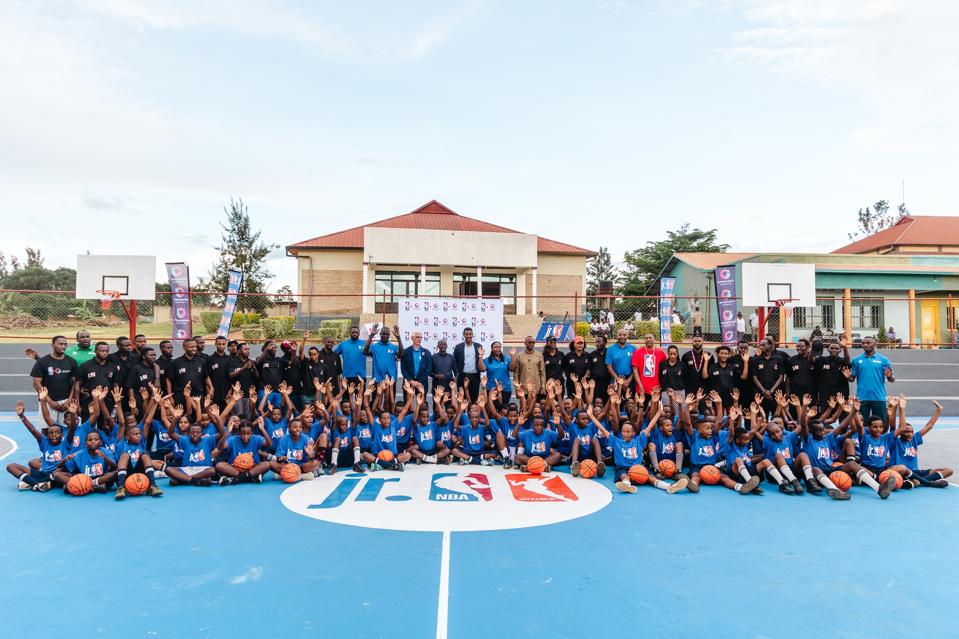Africa is home to the youngest population on Earth; more than 70% of its people are under 30. But while youth drive the continent’s demographic growth, access to safe spaces for learning, play, and mentorship remains limited. In response to this pressing need, NBA Africa has launched a bold initiative: to build 1,000 basketball courts across the continent over the next decade.
Of that ambitious total, 10%, or 100 courts, will be developed in partnership with Opportunity International, a global organisation focused on unlocking economic potential in underserved communities. Together, the NBA and Opportunity International aim to create not just basketball courts, but high-impact hubs of youth development across Africa’s fastest-growing markets.
Why Basketball?
The initiative’s rollout began in Nyamata, Rwanda, where the newly built court at Highland School is already buzzing with energy. The site hosted a Jr. NBA clinic for 100 children, held during the BAL’s Nile Conference, currently taking place in Kigali. For many of these children, it marked their first structured introduction to the game and to a vision of what’s possible.
Among all the potential sports for driving development, why should basketball become a priority? According to Randy Kurtz, Executive Vice President of International Programs and Capital Solutions at Opportunity International, the answer is both strategic and personal.
“As I’ve learned, basketball is the largest and fastest-growing sport in Africa,” Kurtz stated following the unveiling of the first court in Nyamata, Rwanda. “So it’s the perfect partner.”
Basketball offers more than just popularity; it is a sport characterised by its accessibility. With just a ball, a hoop, and a court, it can be played in both urban and rural settings. Its high global visibility and relatively low barriers to entry make it an ideal platform for skill-building, aspiration, and mobility.
BAL and Grassroots Synergy
For Amadou Gallo Fall, President of the Basketball Africa League (BAL), the moment signals the league’s mission: growing the game from the grassroots up.
“Making the game of basketball accessible to young boys and girls… remains a critical pillar of our efforts,” Fall said. “It all starts with infrastructures like this.”
Though the BAL Finals have been hosted in Kigali since the league’s inception, Fall is clear, the league’s impact must go beyond elite competition.
“We want to continue to now, beyond just bringing the BAL, [ask]
how do we make sure that young people who want to play the game have safe places to play and learn?”
Courts as Gateways: A Model for Scale
The collaboration between Opportunity International and NBA Africa is about far more than pouring concrete. It’s a blueprint for inclusive, scalable access, built on local partnerships and sustainable programming.
“This comes out of personal relationships,” said Kurtz, referencing how longtime NBA supporter Sam Garvin helped connect the organisation to league leadership. “But with the NBA’s support, we now have a clear path to reach 500,000 youth over five years.”
Structured programming, anchored by the Jr. NBA curriculum, introduces students to the fundamentals of basketball, teamwork, and life skills. It’s not just about building courts; it’s about building character, confidence, and community.
“We use the curriculum that the Jr NBA has and combine it with the good work being done at schools. That’s how we scale,” Kurtz explained.
The rollout will continue across 10 African countries where Opportunity International already operates, starting with Rwanda and Kenya, with room to grow based on need and demand.
“There’s no limit,” Kurtz added. “We could go to countries where we are not.”
Investing in Coaches and Community Leaders
But infrastructure alone isn’t enough. Central to the effort is the development of local coaching talent, the people who will guide young players not only in sport, but in life.
“As important as the physical infrastructure is,” Fall emphasised, “it is equally important to make sure we have experts who can teach the game.”
These coaches become local leaders and role models, instilling discipline, teamwork, and ambition. By investing in their training and progression, the program ensures the impact goes far beyond the court.
“We want to build capacity among young coaches and allow them to advance,” Fall said. “This Jr. NBA clinic is just the beginning.”
The Urgency of Now
Africa’s demographic trajectory underscores the urgency. As cities expand and economies shift, the need for physical and social infrastructure becomes even more critical. In this environment, sport has emerged as one of the most effective tools to bridge education, economic mobility, and youth empowerment. Basketball, in particular, is uniquely positioned to meet the moment. With low costs, high visibility, and proven developmental impact, it is becoming a new language of opportunity for Africa’s next generation.

